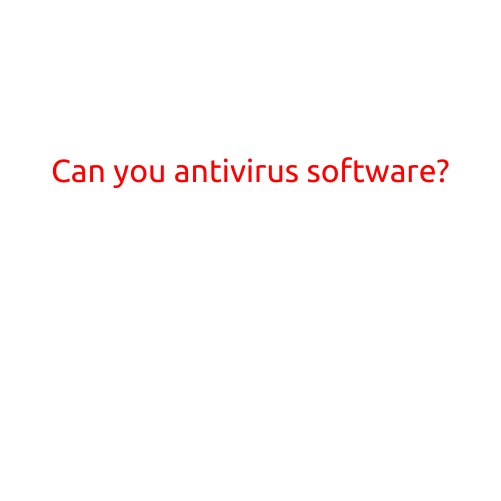
Can You Really Trust Antivirus Software?
In today’s digital world, antivirus software has become a staple in our computers and devices. We rely on them to protect our sensitive information and guard against malicious threats. But have you ever stopped to think if you can really trust these programs? Can you trust that they’re doing their job effectively, or are they putting your data at risk?
The Evolution of Antivirus Software
Antivirus software has come a long way since its inception in the 1980s. Initially, it was designed to detect and remove viruses from computers. However, as malware evolved, so did the technology. Today, antivirus software incorporates advanced features like real-time protection, behavioral analysis, and advanced threat detection.
The Challenges
Despite the advancements, there are still concerns about the effectiveness and reliability of antivirus software. Here are some of the challenges that have been raised:
- Virus Updates: Antivirus software relies on regular updates to stay ahead of new threats. However, these updates can sometimes cause more harm than good, especially if they’re not thoroughly tested.
- False Positives: Some antivirus software may incorrectly flag legitimate files or applications as malware, leading to frustration and potential data loss.
- Performance Issues: Antivirus software can consume system resources, slowing down your computer’s performance and potentially causing other issues.
- Lack of Transparency: Some antivirus software may not clearly disclose their methods for detecting and removing malware, raising concerns about their effectiveness and accountability.
The Pros and Cons
To shed light on the effectiveness of antivirus software, let’s weigh the pros and cons:
Pros:
- Protection: Antivirus software provides a comprehensive layer of protection against malware, viruses, and other online threats.
- Real-time Scanning: Many antivirus software offer real-time scanning, which detects and removes threats as they emerge.
- Advanced Features: Some antivirus software incorporate advanced features like password managers, firewalls, and VPNs.
Cons:
- False Alarms: As mentioned earlier, false positives can be frustrating and damaging to your data.
- Resource Intensity: Antivirus software can consume system resources, leading to performance issues.
- Unreliability: Some antivirus software may not be completely reliable, potentially leaving your data vulnerable.
The Verdict
Can you really trust antivirus software? The answer is ambiguous. While antivirus software provides excellent protection against malware and viruses, there are still concerns about their effectiveness and reliability.
So, what can you do?
- Choose a reputable antivirus software: Opt for well-known and trusted antivirus software that has a strong reputation for detecting and removing malware.
- Regularly update your antivirus software: Ensure your antivirus software is up-to-date to stay ahead of new threats.
- Monitor your system’s performance: Keep an eye on your system’s performance and adjust your antivirus software settings to minimize resource consumption.
- Use other security measures: Combine your antivirus software with other security measures, such as firewalls, password managers, and VPNs, to provide a comprehensive security solution.
In conclusion, while antivirus software is an essential tool in the fight against malware and viruses, it’s crucial to be aware of its limitations and potential drawbacks. By choosing a reputable antivirus software, regularly updating it, monitoring your system’s performance, and using other security measures, you can trust your antivirus software to some extent.





